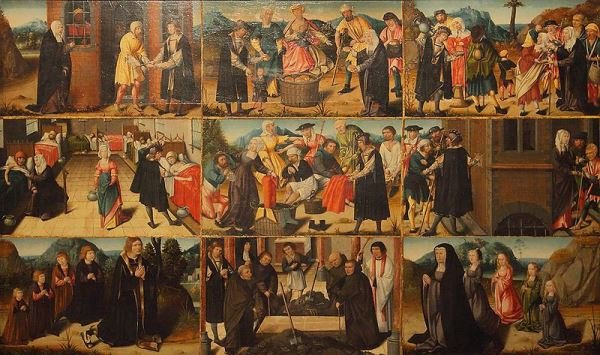Translation of the Prelate's audio recording is found below.
To listen to the 9-minute audio in Spanish click here.
Today we consider two more corporal works of mercy: feeding the hungry and giving drink to the thirsty. God, Father of Mercy, has nourished his People down through the centuries and continues doing so each day, when He provides food for our table. That’s why it is very fitting to foster among families the custom of praying before meals and thanking God at the end for his blessings. Let us not fail to live this custom, including when we are away from home, since it is a deep manifestation of faith, and could be very effective apostolically for those around us.
In this extraordinary Jubilee of Mercy, the daily gift of food should not only spur us to thank God, but also provoke in us a concern for the sisters and brothers of ours who lack daily sustenance. Think of the millions of people worldwide who have nothing, or practically nothing, to eat. By contrast, in other places food is wasted: to eliminate excess reserves, or out of negligence, or to keep prices high.
“Food that is thrown away,” the Holy Father said, “is food stolen from the table of the poor.” Therefore on several occasions the Pope has asked that we improve the global distribution of produce, and thus help combat, by these and other initiatives, what he calls the “throwaway culture.”
Let us turn our eyes to Christ, and admire how he multiplied the loaves and fishes to feed the hungry multitude. A bit earlier, the Apostles had suggested to Jesus that He send the people away: “Let them go to the nearby villages and hamlets to look for shelter and food, because we are in a desert place,” they tell our Lord. Surprisingly, the Apostles, after hearing the Word of God, wanted each family to seek sustenance on their own account. But our Lord shows with deeds that feeding the hungry is everyone’s responsibility. “You give them something to eat,” Jesus tells them. And then He works the great miracle that fills everyone with awe.
The Twelve learned their lesson well, since later on in the early years of the Church they encouraged the distribution of food among the poorest of the faithful. This attitude has been present in the Church right to this day, and a great number of charitable initiatives have been brought forward by Christians. In underdeveloped countries, and also in the peripheries of developed ones, we find food banks, soup kitchens, culinary schools for the uneducated and many other service initiatives. Let us not settle for simply admiring these initiatives; at the very least, we can pray for them and lend a hand if we find ourselves in conditions to do so.
Filled with joy and generosity, let us be bearers of God’s mercy to everyone, and especially to the needy. We will find many different possibilities to do so if we practice charity: for example, dedicating time regularly to solidarity organizations or even devoting oneself to such a task professionally; donating money to these initiatives; working to amend laws that prevent fair food trade; avoiding wasting food at home, and so on.
Christ’s words should resonate in our souls: “I was hungry and you gave me food; I was thirsty and you gave me drink.” Let us ask ourselves: what can I do? How can I encourage others?
Jesus, the Giver of Life, not only distributed the loaves and fishes on a hill in Galilee, but when the sublime moment of the Last Supper came, we see Him distributing the bread that had become his Body and the wine that had become his Blood. If we ever find excuses for not committing ourselves to works of charity, or if selfishness leads us to look away from those who lack basic needs; if we waste money on ourselves; or if we think that hunger is a problem too complex to deal with personally, let us look more intently at Christ in the Eucharist: He, the fullness of Justice, has offered Himself as Food and given Himself completely. He came into this world so that his Life could be nourishment for our own. His generosity gives us vigor, and his death brings us life.
Jesus, the face of the Father’s mercy, gives us the nourishment of his Body and Blood under the appearances of bread and wine, thus enabling us to share in eternal life. Let us imitate him: although we cannot give ourselves to that extreme, we do have the chance to give food and drink to the members of Christ’s Mystical Body, inviting them to the Eucharist as well as providing them with material assistance.
From the beginning of Opus Dei, Saint Josemaría instilled a great Christian zeal in those at his side, encouraging them to go out and encounter the indigent and those lacking material means; his affectionate concern embraced both the needy and those who try to cover up their poverty with dignity. He called them “our Lady’s poor” and would visit them regularly on Saturdays in Mary’s honor. He practiced this work of mercy without humiliating them. He encouraged the young fellows accompanying him to give these poor people a bit of money or something entertaining to read, simple toys for their children, some sweets that only the well-off could afford…. But above all, they tried to give them affection, conversation, a genuine concern for their needs and problems, because they saw in them—with great joy!—their brothers.
Each of us has opportunities to do likewise in our daily lives. We can ask Saint Josemaría to help us discover them and follow his example of service, of charity, which is true affection.
